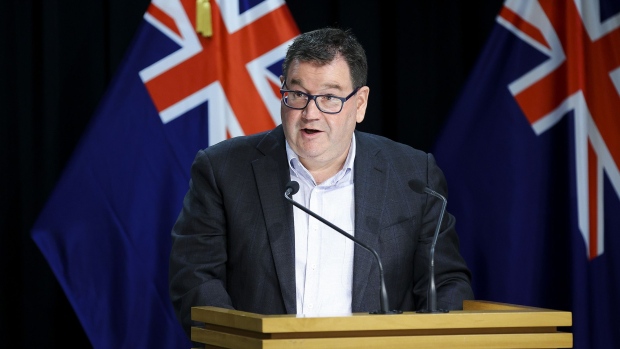Jan 23, 2022
New Zealand Urges Business to Be Ready for Omicron Disruption
, Bloomberg News

(Bloomberg) -- New Zealand’s government is warning businesses to be prepared for labor shortages and supply disruptions as omicron takes hold in the community.
Finance Minister Grant Robertson has urged companies to ensure business continuity plans are in place and pledged government support, but warned that the impact of the variant could be severe. Modeling showed that in a scenario of 25,000 daily cases there could be 350,000 workers a day self-isolating, he said.
“What we see from overseas is the supply side of the economy is where the big impacts have been,” Robertson told reporters Sunday in Wellington. “We’re working very hard to make sure we don’t see disruption but inevitably there will be some.”
Prime Minister Jacinda Ardern tightened Covid-19 restrictions effective from 11:59 p.m. yesterday after evidence that omicron had begun circulating in the community. The “red” setting includes gathering limits and social distancing requirements but unlike the government responses to previous outbreaks, there is no national or regional lockdown, which means business remain open and people can travel.
Robertson said the government will provide leave-support payments for businesses to pay workers who are required to self-isolate at home and unable to work because they are infected or are close contacts of confirmed cases. Based on 25,000 cases a day the support scheme will pay employers about NZ$50 million ($34 million) a week, he said.
The government will monitor the rate of spread of omicron and economic data to gauge whether more targeted support is needed, he said. Ministers will also announce plans this week to enable essential industries and companies vital to the supply chain to begin a test-to-work regime using rapid antigen testing to assist with business continuity, he said.
Robertson has less than NZ$4 billion remaining in a NZ$62 billion economic support fund set up in 2020 to respond to the pandemic. The nation has low debt and sufficient fiscal headroom to provide more money if needed, he said.
“We have resources within the fund to handle this immediate response,” he said. “If further resources are needed to protect New Zealanders lives and livelihoods we will do as we have done before and make those resources available. We can afford it, and really we can’t afford not to do it.”
©2022 Bloomberg L.P.